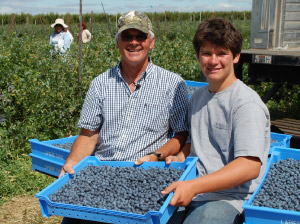Labor shortages growing problem
by Eli Penberthy, co-editor
This article was originally published in October 2012

For those of us with a soft spot for the sweet cherries of summer, here’s an upsetting post script:
Mark LaPierre, who grows organic Bing and Rainier cherries for PCC, ended the season with a fair amount of fruit still on his trees. He simply didn’t have enough hands to get the fruit picked.
“Cherries are a labor-intensive fruit,” says LaPierre, “and they came on early this year, so we didn’t have our harvest crew ready to pick them.”
Other farmers of various crops across the state faced a similar fate. Washington asparagus growers had to leave about 10 percent of their crop in the fields this year for the first time in recent history.
Stricter immigration enforcement, an ineffective guestworker program, and lack of national immigration reform are to blame for shrinking the number of available farmworkers. Surveys show Americans simply do not want to do these jobs and farmers report that when they do, they’re not as good at it.
It’s ironic that in a country with more than 8 percent unemployment, labor shortages are threatening the foundation of the food system.
About 150,000 seasonal workers are needed to harvest Washington crops each year, but many are deciding the trip isn’t worth the cost or risk. That’s because “coyote” labor smugglers reportedly have increased their fees sharply, by about one-third — to $6,000 — to smuggle immigrants across the border.
Border violence deters workers, too. Mexican drug cartels kidnap farm workers and sometimes hold their families hostage, forcing the families to smuggle drugs.
Nevertheless, many workers do take the risk. The farm-labor workforce traditionally has been estimated to be as much as 75 percent illegal.
A lot is at stake for farmers, too, who may hire illegal workers with forged papers.
“Farms can be shut down if they’re found to have illegal workers,” says PCC’s produce merchandiser, Joe Hardiman. “Farmers face tremendous pressure.”
It’s ironic that in a country with more than 8 percent unemployment, labor shortages are threatening the foundation of the food system.
Hardiman says, “The reality is Americans refuse to do the backbreaking work.”
Despite the early-ripening cherry crop this year that went partly unpicked, LaPierre is smart and fortunate he has found a way to keep a steady, dependable labor crew. His crops ripen at different times, so he’s able to hold on to workers throughout the season, providing a steady succession of work.
Harvesters pick cherries and blueberries from the end of June to mid-July. Nectarines, then pears and apples are picked in the late summer and fall. When there are lulls in the harvests, LaPierre ensures there’s work to be done preparing the trees and bushes for the following year.
“These workers are so important to our industry,” LaPierre says. “We have lower turnover, which is good because it provides stability for the workers and also results in higher-quality fruit.” Well-trained workers know how to pick the best fruit and package it so it arrives at PCC perfectly ripe.
Vegetable growers may have felt the shortage a little more. Vegetable-picking and weeding is stoop labor, a job done on hands and knees, and it doesn’t pay as well as picking fruit.
Organically Grown Company, which provides much of PCC’s organic produce, says at least one of its buyers missed orders because the pickers didn’t show up — they went to pick fruit instead.
Desperation to fill customer orders apparently pushed HerbCo, a western Washington culinary herb grower, to rehire illegal workers. A raid by Immigration and Customs Enforcement in April 2011 prompted the HerbCo company to fire 86 workers after an audit showed their documentation was illegal — but HerbCo rehired some of the workers when unable to keep its commitment to customers.
The law requires employers to make hiring decisions before asking about documentation, and then, if a worker’s papers appear valid, the employer is precluded from asking further questions.
The American approach to ag labor is nonsensical, akin to “cutting off the nose to spite the face,” says PCC’s Hardiman. It will have dire consequences on the price of food, he predicts, until we have meaningful immigration reform.
